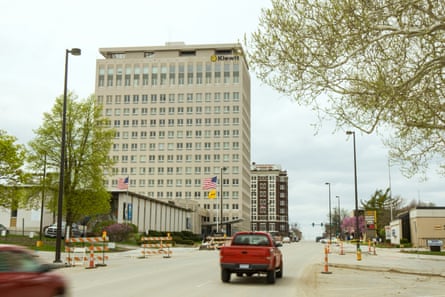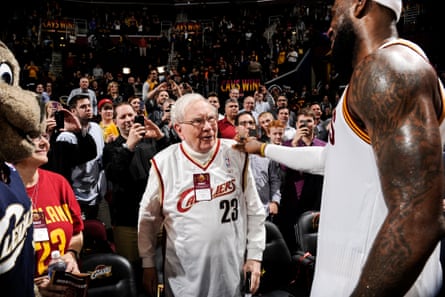As dawn broke on Saturday, thousands had gathered outside Omaha’s CHI Health Center Arena. Some arrived before 3.30am, standing for hours in the drizzle.
This is a “once-in-a-lifetime opportunity”, said Larry Blivas, 70, near the front of the line. The realtor traveled from Los Angeles to see “an icon”, he explained.
“He’s a legend,” added Andrew Lee, 50, from New York.
The masses had not descended to catch a weathered rock star’s farewell tour, but the annual meeting of Berkshire Hathaway, a conglomerate, chaired by a nonagenarian billionaire: Warren Buffett, 93, was about to take the stage. Many of his loyal fans wonder how many more times he will appear, and what the future holds for Berkshire Hathaway – and Omaha.
They call it “Woodstock for Capitalists”. For decades, tens of thousands of moneyed investors have flocked from across the world to the Nebraskan city for a jamboree hosted by corporate America’s answer to Lennon and McCartney.
Buffett and Charlie Munger – who died last year, aged 99 – amassed a legion of followers by transforming Berkshire Hathaway from a struggling textiles manufacturer into a sprawling global conglomerate – and generating handsome returns for shareholders along the way.
His empire, which includes a manufactured-housing business accused of exploitation, and gigantic investments in fossil fuels, is not without controversy. But to his investors, Buffett and Mungers have long been heroes.
“They’ve made me a lot of money over the years,” said Blivas. Buffett, in his view, is “the greatest of all time” – and “might not be around too much longer”. When the time comes for a new generation to take charge, Blivas does not plan to turn up at 4am, as he did this weekend.

Munger’s death in November marked the end of an era, and after more than half a century, Berkshire is steeling disciples for the next chapter. Addressing the company’s latest annual meeting this weekend, he declared that its structure as a company, designed by Munger, “lived beyond his lifetime, and will live far beyond mine”.
Shareholders “don’t have too long to wait” before his chosen successors step up, Buffett remarked at one point during the meeting. “Generally, I feel fine,” he added hastily, “but I know a little bit about actuarial tables,” conceding he “shouldn’t be taking on any four-year employment contracts”.
Greg Abel, his chosen successor, was at his side on Saturday. “One way or another, there are more than 24 hours in his day,” Buffett told investors. “This place, if anything happened to me, it would be working extremely well the next day.”
The prospect of Berkshire without Buffett tomorrow has, nevertheless, layered an air of apprehension across Omaha today.
The firm’s shareholders diligently travel hundreds, if not, thousands, of miles to hear from the so-called sage of Omaha. Some 93% of the city’s hotel rooms are said to be booked out before each meeting, setting up one of the busiest weekends of the year for its businesses.
Whether Berkshire’s new guard will have the same star power, and pull such vast crowds – without the card-carrying capitalist icons who built it – is a worry for locals.
“The company is all about Buffett,” said Colin Duggan, who owns and runs Kitchen Table, a downtown cafe, with his wife, Jessica. “If Buffett’s not around? Yeah, we’re nervous. We’re a little nervous about it, for sure.”

Buffett relocated Berkshire from New England to his hometown back in 1970, a few years after taking control. The company, and its chief executive, have stayed put ever since – and become omnipresent throughout the city.
Over the years, residents have spotted the tycoon (currently the world’s ninth-richest person, according to Bloomberg, with a personal fortune of $132bn) playing ping-pong with Bill Gates, eating ice cream with Paul McCartney and having dinner with LeBron James – unlikely scenes in a city that sits not on the “elitist” coasts, but at the heart of America’s Great Plains region.
Despite his extraordinary wealth, Buffett still famously lives in the five-bedroom house he bought for $31,500 in 1958. “It’s not a flashy neighborhood, by any means. It’s not a flashy house,” laughed Colin Duggan, 45, who grew up in the area. “It was really, really strange to see all these tourists, with cameras, taking pictures.”

The mix of mega-wealth and modesty has proven magnetic each spring. Back in 2022, shortly after opening Godega Market, a corner store and cafe, owners David Kerr, 35, and his partner, Nate Flick, 34, were still working the counter when they heard the impact of Berkshire’s annual meeting.
Standing by the coffee machine, “every third or fourth” accent in the line prompted Kerr, 34, to ask where customers were from. The answers varied from Australia to Brazil. “It was very refreshing,” he said.
A short walk away, Kitchen Table was also humming this weekend. Jessica Duggan, 44, estimated that Sunday – the day after Berkshire shareholders fill up Omaha’s 18,975-seat CHI arena – was typically the cafe’s biggest of the year. The whole weekend is “really huge for us,” added Colin.
“You can talk with probably any business, any restaurant, any hotel during this period,” said Deborah Ward, executive director of Visit Omaha, its tourism agency. “Berkshire Hathaway makes an impact every year.”

For all that the firm has given Omaha, Buffett claims, it has also been rewarded. Both its architects were born there, and the executives tapped to lead it forward – Abel, 61, who already oversees Berkshire’s non-insurance businesses, and Ajit Jain, its vice chairman of insurance operations, 72 – previously lived in the city.
“So what is going on? Is it Omaha’s water? Is it Omaha’s air?” Buffett wondered in his annual letter. “Is it some strange planetary phenomenon akin to that which has produced Jamaica’s sprinters, Kenya’s marathon runners, or Russia’s chess experts?”
“Keep an open mind. Come to Omaha in May, inhale the air, drink the water,” he wrote, urging investors to introduce themselves to his sister, Bertie, “and her good-looking daughters”.
Whether to hear from Buffett or meet Bertie’s daughters, people came.
Ramya and Shiva Amrit flew from Bellevue, Washington. Both have followed Berkshire since high school. While Ramya agrees that it’s “not going to be the same” without Buffett, he and his wife plan to keep coming. Abel is “a close second”, he said, “so I’ll still be here.”
Many shareholders arrive a day early for a discount shopping day. “This is really, really, really busy,” said Priscilla Cardenas, 59, who first bought shares 15 years ago, and turned up hours before doors opened to find bargains at Fruit of the Loom, Berkshire’s clothing retailer.
“People love to see Warren,” said Nancy, 62, who traveled from Santa Fe, New Mexico.
“Keeping the dream alive – the financial dream,” added her friend Lisa, 60. “Money’s not taboo for him. Being extra wealthy is not taboo.”
Michael Graham, 22, drove 14 hours from Youngstown, Ohio, with his dad, also Michael, 59. Buffett “just has that way about him”, he said. “Whenever he talks, you just want to listen.”
The legacy of Omaha’s so-called oracle will endure, according to Graham. “I feel like the base he’s built, it’s hard to mess it up,” he said. But will investors still turn up in droves once Abel, Buffett’s publicity-shy heir apparent, is running the show?
“That’s a good question.”

“Omaha and Berkshire Hathaway have this thing. It almost defies explanation,” said Ward, of Visit Omaha, who is “hopefully confident” the firm will stay in her city for years to come.
Kerr, at Godega Market, also expressed hope that “whenever Warren Buffet passes the CEO baton” that Berkshire “will always consider” Omaha its home – and that its shareholders keep coming “year after year”.
“It is off the beaten path, I think that’s fair to say,” he said. “It’s not your typical tourist town. But that’s also refreshing. I’m sure there’s many people from different countries that wouldn’t just throw a dart and go to Omaha, Nebraska, but maybe are pleasantly surprised when they arrive.”

Thanking investors for coming, Buffett alluded once more to the question on so many of his shareholders’ minds. “I not only hope you come next year, but I hope I come next year,” he chuckled. His disciples took to their feet and applauded. “I’ll see you next year,” he said.
Under new management, Berkshire might continue to thrive. Profits within its insurance, railroad and peanut-brittle businesses could surge; its $336bn investment portfolio, with stakes in companies from Apple to Chevron, might swell; its stock may well scale fresh heights.
But this firm was built around a fanbase: not just shareholders, but a unique, dedicated community of followers, who travel far and wide to catch the big show, buy the merch, and jostle to get close to the stage.
While a fervent and vocal generation has emerged in recent years, it materialized online. Young retail investors, to Buffett’s dismay, mobilized on social media to coalesce around a string of “meme stocks” like GameStop and AMC. Day-trading the hottest new fad on Robinhood could not be much further from his ardent belief in the power of long-term investment.
The challenge facing Buffett’s successors will not just be to shore up profits, but to preserve the passion of Berkshire’s true believers: those still prepared to put their faith in a conglomerate, rather than Reddit tips.
In years to come, on the morning of the firm’s annual meeting, those in charge could do worse than wander Omaha’s streets, and count how many investors remain willing to line up before sunrise for the best seats in the house.
https://news.google.com/rss/articles/CBMiYGh0dHBzOi8vd3d3LnRoZWd1YXJkaWFuLmNvbS9idXNpbmVzcy9hcnRpY2xlLzIwMjQvbWF5LzA0L3dhcnJlbi1idWZmZXR0LWJlcmtzaGlyZS1oYXRoYXdheS1vbWFoYdIBAA?oc=5
2024-05-05 06:00:00Z
CBMiYGh0dHBzOi8vd3d3LnRoZWd1YXJkaWFuLmNvbS9idXNpbmVzcy9hcnRpY2xlLzIwMjQvbWF5LzA0L3dhcnJlbi1idWZmZXR0LWJlcmtzaGlyZS1oYXRoYXdheS1vbWFoYdIBAA
Tidak ada komentar:
Posting Komentar